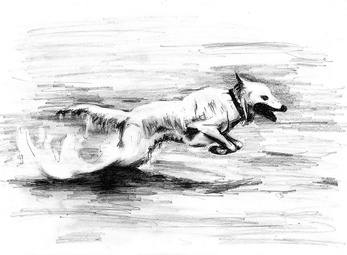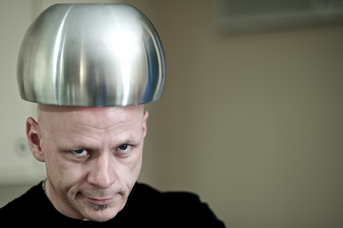 Not related to the book whatsoever. (Weebly)
Not related to the book whatsoever. (Weebly) So I decided to pony up and try to write a book (after one naive attempt in high school and another brazen one in college). This time around, I aimed to write 2,000 words a day. After ten days, I had 20,000 words of what I thought a book should be, rather than what I wanted my book to be. So I scrapped it all and started over.
Now I'm enjoying what I'm writing. It's pretty out there, perhaps, but I like that. I like to think I've taken a lot from Douglas Adams, he who penned the Hitchhiker's Guide to the Galaxy, but I realize it could just be that I've tried to take a lot from him and botched it all.
I had a title for the book. Then I changed it to Godwright tries really hard not to fuck up too much. Then Jewels said that was awful, which I kinda knew deep down, so now I just have it saved as Godwright.
I'll be honest, I named the guy Godwright for no deeply meaningful reason. I always thought I'd give two things really meaningful names: the main character of my first book and my first child.
Of course I also thought I would have a few published short stories by the time I started writing my first book, but you know, sometimes writing turns out to be a bit harder than your naive mind had it pegged for so you gotta despair a bit and question your ability. That's fine, though–probably even better that way or whatever.
Here's a bit of the plot that I have so far. Godwright is a new teacher at an inner-city school. He is struggling, naturally. Students scream at him and one threatens to punch him. Then he hooks up with another teacher, who gets pregnant, and as she tells Godwright that she's pregnant, the student that threatens to punch him (along with four cronies) hears her tell Godwright she's pregnant. So then that turns into a bit of a problem because the principal is very much against relationships between teachers.
Anyway, that's what I have so far. It's been a giggle to write, and oftentimes I'll find myself laughing at what I'm writing, which either means I genuinely think it's funny or I'm trying to force myself to believe it's funny, and I'm never sure which it is.
In On Writing by Stephen King, he writes that authors must compose their first drafts with the figurative door to the world closed. He's rather adamant about that. However, I want to share just a little bit of what I've written. Let's say the door is still closed, but that I'm slipping a few paragraphs under the door to you, dearest blog reader.
My first couple lines are these:
“You sit down, mothafucka,” said Eli as the rest of the class froze in eager anticipation. They were probably thinking that a show was coming, maybe even one that involved a student rattling a teacher’s cage, swinging a couple of lazy fists into his jaw, perhaps dislodging some teeth.
I am that teacher. I gauged Eli’s anger as being pretty damn high, noticed the path to the door was blocked by ravenous students that could smell blood, and checked the window to see if it was open and if I could jump out if Eli started loping toward me.
The window was open. Thank God.
I've noticed as I've been writing that I really like long sentences that are funny because they are long. Or maybe it's that they're distracting because they're long. Whatever, I really like long sentences. Here's one. (Godwright can't remember the student's name, but he's pretty sure it's either Respect or Ronald. It turns out it's Thomas, but that's superfluous.)
Respect or Ronald wasn’t exactly a big kid–he’d been the water boy on the football team and broken his leg when he’d tripped on a sprinkler head as he was running water out to the huddle, which reminded me a great deal of my own high school days when I’d been a water boy for the water polo team and nearly broken my leg after I’d slipped on the wet deck, despite all the signs that said ‘No RUNNING’, during my school’s state championship loss to the Wilmington Whalers, whose title was later stripped because their water boy had been giving his team weed-laced protein bars, unbeknownst to anyone except the water boy and his dealer, who happened to be the Wilmington Whalers water polo coach, but that’s another story.
Is that funny or just annoying? Oh, don't answer that! My door is figuratively closed; I'm just slipping you things under it, you can't slip stuff back. Just kidding. Anyway.
One last passage. It's the one sex scene I've written. I hope you like it.
I met her at her small apartment. We never ate the pie, although we got so far as to set it on the counter with two plates and two forks to boot. But just before we cut into it, Fellena pushed the plates and utensils out of the way, hopped on the counter, pulled me in so she was straddling me, and.
Yadda yadda yadda. Pretty steamy, huh? I love that and period. I rarely see that, the and period. Maybe I've never seen it. But that's how the sex scene ends. Tantalizing, right?
Also, is this font really small or does it just appear that way next to those big letters? Weebly is the bee's shins when it comes to adjusting font. It's so unpredictable! There's just a plus and minus sign that you can click, but I never seem to know how much bigger or smaller hitting one of those buttons is going to make the letters.
Anyway, I can't help but wonder what is possible for the book. I'd like to say I'm just doing this just for the love, but I think any writer that doesn't want other people to read his or her writing isn't doing it right.
One last thing to divulge. Before I start writing I often find myself turning on this song with Pavarotti and Jeff Beck. I think it's great, really gets me going when I'd rather mope about everything.
Now I'm enjoying what I'm writing. It's pretty out there, perhaps, but I like that. I like to think I've taken a lot from Douglas Adams, he who penned the Hitchhiker's Guide to the Galaxy, but I realize it could just be that I've tried to take a lot from him and botched it all.
I had a title for the book. Then I changed it to Godwright tries really hard not to fuck up too much. Then Jewels said that was awful, which I kinda knew deep down, so now I just have it saved as Godwright.
I'll be honest, I named the guy Godwright for no deeply meaningful reason. I always thought I'd give two things really meaningful names: the main character of my first book and my first child.
Of course I also thought I would have a few published short stories by the time I started writing my first book, but you know, sometimes writing turns out to be a bit harder than your naive mind had it pegged for so you gotta despair a bit and question your ability. That's fine, though–probably even better that way or whatever.
Here's a bit of the plot that I have so far. Godwright is a new teacher at an inner-city school. He is struggling, naturally. Students scream at him and one threatens to punch him. Then he hooks up with another teacher, who gets pregnant, and as she tells Godwright that she's pregnant, the student that threatens to punch him (along with four cronies) hears her tell Godwright she's pregnant. So then that turns into a bit of a problem because the principal is very much against relationships between teachers.
Anyway, that's what I have so far. It's been a giggle to write, and oftentimes I'll find myself laughing at what I'm writing, which either means I genuinely think it's funny or I'm trying to force myself to believe it's funny, and I'm never sure which it is.
In On Writing by Stephen King, he writes that authors must compose their first drafts with the figurative door to the world closed. He's rather adamant about that. However, I want to share just a little bit of what I've written. Let's say the door is still closed, but that I'm slipping a few paragraphs under the door to you, dearest blog reader.
My first couple lines are these:
“You sit down, mothafucka,” said Eli as the rest of the class froze in eager anticipation. They were probably thinking that a show was coming, maybe even one that involved a student rattling a teacher’s cage, swinging a couple of lazy fists into his jaw, perhaps dislodging some teeth.
I am that teacher. I gauged Eli’s anger as being pretty damn high, noticed the path to the door was blocked by ravenous students that could smell blood, and checked the window to see if it was open and if I could jump out if Eli started loping toward me.
The window was open. Thank God.
I've noticed as I've been writing that I really like long sentences that are funny because they are long. Or maybe it's that they're distracting because they're long. Whatever, I really like long sentences. Here's one. (Godwright can't remember the student's name, but he's pretty sure it's either Respect or Ronald. It turns out it's Thomas, but that's superfluous.)
Respect or Ronald wasn’t exactly a big kid–he’d been the water boy on the football team and broken his leg when he’d tripped on a sprinkler head as he was running water out to the huddle, which reminded me a great deal of my own high school days when I’d been a water boy for the water polo team and nearly broken my leg after I’d slipped on the wet deck, despite all the signs that said ‘No RUNNING’, during my school’s state championship loss to the Wilmington Whalers, whose title was later stripped because their water boy had been giving his team weed-laced protein bars, unbeknownst to anyone except the water boy and his dealer, who happened to be the Wilmington Whalers water polo coach, but that’s another story.
Is that funny or just annoying? Oh, don't answer that! My door is figuratively closed; I'm just slipping you things under it, you can't slip stuff back. Just kidding. Anyway.
One last passage. It's the one sex scene I've written. I hope you like it.
I met her at her small apartment. We never ate the pie, although we got so far as to set it on the counter with two plates and two forks to boot. But just before we cut into it, Fellena pushed the plates and utensils out of the way, hopped on the counter, pulled me in so she was straddling me, and.
Yadda yadda yadda. Pretty steamy, huh? I love that and period. I rarely see that, the and period. Maybe I've never seen it. But that's how the sex scene ends. Tantalizing, right?
Also, is this font really small or does it just appear that way next to those big letters? Weebly is the bee's shins when it comes to adjusting font. It's so unpredictable! There's just a plus and minus sign that you can click, but I never seem to know how much bigger or smaller hitting one of those buttons is going to make the letters.
Anyway, I can't help but wonder what is possible for the book. I'd like to say I'm just doing this just for the love, but I think any writer that doesn't want other people to read his or her writing isn't doing it right.
One last thing to divulge. Before I start writing I often find myself turning on this song with Pavarotti and Jeff Beck. I think it's great, really gets me going when I'd rather mope about everything.




